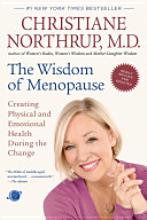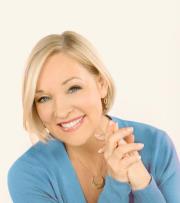Adapted with permission from The Wisdom of Menopause, by Christiane Northrup, M.D. (Random House, 2012).
 There is much, much more to this midlife transformation than “raging hormones.” Research into the physiological changes taking place in the perimenopausal woman is revealing that, in addition to the hormonal shift that means an end to childbearing, our bodies—and, specifically, our nervous systems—are being, quite literally, rewired. It’s as simple as this: our brains are changing. A woman’s thoughts, her ability to focus, and the amount of fuel going to the intuitive centers in the temporal lobes of her brain all are plugged into, and affected by, the circuits being rewired. After working with thousands of women who have gone through this process, as well as experiencing it myself, I can say with great assurance that menopause is an exciting developmental stage—one that, when participated in consciously, holds enormous promise for transforming and healing our bodies, minds, and spirits at the deepest levels. There is much, much more to this midlife transformation than “raging hormones.” Research into the physiological changes taking place in the perimenopausal woman is revealing that, in addition to the hormonal shift that means an end to childbearing, our bodies—and, specifically, our nervous systems—are being, quite literally, rewired. It’s as simple as this: our brains are changing. A woman’s thoughts, her ability to focus, and the amount of fuel going to the intuitive centers in the temporal lobes of her brain all are plugged into, and affected by, the circuits being rewired. After working with thousands of women who have gone through this process, as well as experiencing it myself, I can say with great assurance that menopause is an exciting developmental stage—one that, when participated in consciously, holds enormous promise for transforming and healing our bodies, minds, and spirits at the deepest levels.
As a woman in midlife today, I am part of a growing population that is an unprecedented 48.5 million strong in the United States alone. This group is no longer invisible and silent, but a force to be reckoned with—educated, vocal, sophisticated in our knowledge of medical science, and determined to take control of our own health. Think about it: more than 48 million women, all undergoing the same sort of circuitry update at the same time. By virtue of our sheer numbers, as well as our social and economic influence, we are powerful—and potentially dangerous to any institution built upon the status quo. Baby boom women (those born between 1946 and 1964) are now the most affluent and influential group in the world. It’s clear that the world is changing, willingly or otherwise, right along with us. And in many instances, it’s changing for the better.
It’s no accident that the current movement of psychospiritual healing is composed largely of women in their thirties, forties, fifties, and sixties. We are awakening en masse and beginning to deliver a much-needed message of health, hope, and healing to the world.
My personal experience, now shared by millions of others, tells me that the perimenopausal lifting of the hormonal veil—the monthly cycle of reproductive hormones that tends to keep us focused on the needs and feelings of others—can be both liberating and unsettling. The midlife rate of marital separation, divorce, and vocational change confirms this. I, for one, had always envisioned myself married to the same man for life, the two of us growing old together. This ideal had always been one of my most cherished dreams. At midlife I, like thousands of others, had to give up my fantasies of how I thought my life would be. I had to face, head-on, the old adage about how hard it is to lose what you never really had. It means giving up all your illusions, and it is very difficult. But for me the issue was larger than where and with whom I would grow old. It was a warning, coming from deep within my spirit, that said, “Grow... or die.” Those were my choices. I chose to grow.
For most women, identity and self-esteem are generated by our associations and relationships. This is true even for women who hold high-powered jobs and for women who have chosen not to marry.
Men, by contrast, usually get most of their identity and self-esteem from the outer world—the job, the income, the accomplishments, the accolades. For both genders, this pattern often changes at midlife.
Women begin to direct more of their energies toward the world outside of home and family, which may suddenly appear as a great, inviting, untapped resource for exploration, creative expression, and self-esteem. Meanwhile, men of the same age—who may be undergoing a midlife crisis of their own—are often feeling world-weary; they’re ready to retire, curl up, and escape the battles of the workplace. They may feel their priorities shifting inward, toward home, hearth, and family.
The woman in menopause, who is becoming the queen of herself, finds herself at a crossroads of life, torn between the old way she has always known and a new way she has just begun to dream of. A voice from the old way (in many cases it’s her husband’s voice) begs her to stay in place—“Grow old with me, the best is yet to be.” But from the new path another voice beckons, imploring her to explore aspects of herself that have been dormant during her years of caring for others and focusing on their needs. She’s preparing to give birth to herself, and as many women already know, the birth process cannot be halted without consequences.
Caring for others and pursuing unexplored personal passions are not necessarily mutually exclusive choices, but our culture makes them seem so, always supporting the former at the expense of the latter. This is part of what makes the midlife transformation so much of a challenge—as I know only too well. Throughout most of human history, the vast majority of women died before menopause. The average life expectancy for a woman in 1900 was only forty. For those who survived, menopause was experienced as a signpost of an imminent and inevitable physical decline. But today, with a woman’s life expectancy at eighty-four years, it is reasonable to expect that she will not only live thirty to forty years beyond menopause, but be vibrant, sharp, and influential as well. The menopause you will experience is not your mother’s (or grandmother’s) menopause.
Women of the World War II generation, whose female role models tended to be like June Cleaver on Leave It to Beaver, had an entirely different social and political environment in which to make their transition. Menopause (like menstruation, for that matter) was not discussed in public. Today this is no longer true. As we break this silence we are also breaking cultural barriers, so that we can enter this new life phase with eyes wide open—in the company of more than 48 million kinswomen, all undergoing the same transformation at the same time. And, as you’ll soon discover, the changes taking place in midlife women are akin to the power plant on a high-speed train, whisking the evolution of our entire society along on fast-forward, to places that have yet to be mapped.
Whether you climb aboard this fast-moving train or step aside and let it pass will play a major role in how far you go and how you feel along the way. Ultimately, I’ve found this journey bracing, exciting, and health-enhancing. And I’m certainly not alone. A 1998 Gallup survey, presented at the annual meeting of the North American Menopause Society, showed that more than half of American women between the ages of fifty and sixty-five felt happiest and most fulfilled at this stage of life. Compared to when they were in their twenties, thirties, and forties, they felt their lives had improved in many ways, including family life, interests, friendships, and their relationship with their spouse or partner. In other words, the conventional view of menopause as a scary transition heralding “the beginning of the end” couldn’t be further from the truth. So no matter what is happening in your life right now, take heart.
Please join me—and the millions of others who have come before and will come after—as we transform and improve our lives, and ultimately our culture, through understanding, applying, and living the wisdom—and joy—of menopause and beyond.
Adapted with permission from The Wisdom of Menopause, by Christiane Northrup, M.D. (Random House, 2012).
Click here to read an excerpt from The Wisdom of Menopause
This information is not intended to treat, diagnose, cure, or prevent any disease.
All material in this article is provided for educational purposes only. Always seek the advice of your physician or other qualified health care provider with any questions you have regarding a medical condition, and before undertaking any diet, exercise, or other health program.
© Christiane Northrup, Inc. All rights reserved. Reproduction in whole or in part without permission is prohibited.
***
 Christiane Northrup, M.D., a board-certified ob/gyn, is a visionary pioneer, beloved authority in women’s health and wellness, and the author of the ground breaking New York Times bestsellers Women’s Bodies, Women’s Wisdom and The Wisdom of Menopause. Following a 25-year career in both academic medicine and private practice, Dr. Northrup devotes her time to helping women truly flourish. Follow Dr. Christiane Northrup on Facebook, Twitter, at www.drnorthrup.com, and by listening to her weekly Hay House Internet radio show Flourish! Christiane Northrup, M.D., a board-certified ob/gyn, is a visionary pioneer, beloved authority in women’s health and wellness, and the author of the ground breaking New York Times bestsellers Women’s Bodies, Women’s Wisdom and The Wisdom of Menopause. Following a 25-year career in both academic medicine and private practice, Dr. Northrup devotes her time to helping women truly flourish. Follow Dr. Christiane Northrup on Facebook, Twitter, at www.drnorthrup.com, and by listening to her weekly Hay House Internet radio show Flourish!
***
Please note: Dr. Christiane Northrup does not dispense medical advice or prescribe the use of any technique as a form of treatment for physical or medical problems without the advice of a physician, either directly or indirectly. In the event you use any of the information for yourself, neither Dr. Christiane Northrup, contributors to this article, nor the publisher accepts responsibility for your actions.
|